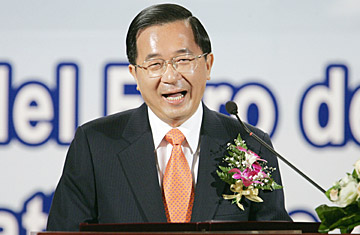
Taiwanese President Chen Shui-bian's rally for a referendum that would take the island's pulse on sovereignty has set Beijing on edge - again
President Chen has proposed a referendum to be held alongside Taiwan's presidential election in March. It would ask the people whether Taiwan should apply to join the United Nations under the name "Taiwan." After Beijing took over Taiwan's U.N. seat in 1971, the island has failed in its attempt to re-enter the body under its formal national title of "Republic of China." Chen says he doesn't want to compete with China for representation, but to find a global voice for Taiwan's 23 million people. Any application to the U.N. by Taiwan would have no chance of succeeding, because China, as a member of the U.N. Security Council, would have veto power. But if Chen simply won the referendum, it would symbolize the island's desire for sovereignty and international recognition.
The bid was dealt a setback by a committee from Taiwan's cabinet that voted to reject the referendum proposed by Chen's Democratic Progressive Party. But Chen has vowed to forge ahead and find a way to get it on the ballot. "I am sure that next year referendums on several issues will be held in tandem with the presidential election," he told the Washington Post last weekend.
The proposal, of course, has riled Beijing. Chinese Foreign Ministry spokesman Qin Gang said the move would "have a grave impact on cross-Straits relations and seriously endanger peace and stability across the Straits and Asia-Pacific region." Still, Beijing's reaction lacked the vitriol that often accompanies its discussion of Taiwan issues. In the past that anger has only strengthened Chen and the electoral prospects of his independence-leaning Democratic Progressive Party (DPP). "Whenever they speak with harsh words ... it would give more credit to the DPP and Chen's leadership," says Andrew Yang, secretary general of the Taipei-based Chinese Council of Advanced Policy Studies. Beijing, he says, is learning to be "more cautious."
Indeed, mainland officials have taken steps to quietly encourage international opposition to the proposal. Part of their cautious approach, says Yang, is to let the U.S. take a lead role in opposing a referendum on U.N. entry. Shortly after Chen announced plans for the referendum U.S. State Department spokesman Sean McCormack said that the U.S. "opposes any initiative that appears designed to change Taiwan's status unilaterally. This would include a referendum on whether to apply to the United Nations under the name Taiwan." He added that "we do not support Taiwan's membership in international organizations that require statehood, including the United Nations." High-ranking Chinese officials have also been conducting a quiet campaign to express their concerns to influential U.S. officials and businessmen, trying to create a tacit consensus in America against Chen's crusade.
Thus far U.S. opposition has done little to dampen Chen's enthusiasm for an island-wide referendum. For Chen, who is coming to the end of his final term as president, it's an issue of legacy, says Loh Chih-cheng, a political science professor at Soochow University in Taipei. "He's pushing to make his name in history," Loh says. (Yang notes that all this could be the president's canny understanding of voter math in Taiwan: a referendum in 2004 helped get out the vote during Chen's re-election campaign.) The opposition Kuomintang (KMT) has accused Chen of using the referendum as a political ploy, but the party announced last week that it too would back a referendum. The KMT says it will in endorse attempting to enter the U.N. under a name less likely to encounter resistance, such as Chinese Taipei, the name the island's athletes use when competing in the Olympics. Given Chinese nervousness about the issue, it's unlikely that applying to the U.N. under a different name would fare any better.
Beijing can't wait for Chen's term to be over — and not just because of its treasured Olympics. There is another prize as well. Both the KMT's presidential candidate, former Taipei mayor Ma Ying-jeou, and the DPP's nominee, former Premier Frank Hsieh, support improved ties with the mainland. "Some window of opportunity exists ahead of us," says Yang. Beijing just has to get over the finish lines without giving in to its Olympic jitters.
With reporting by Natalie Tso/Taipei
